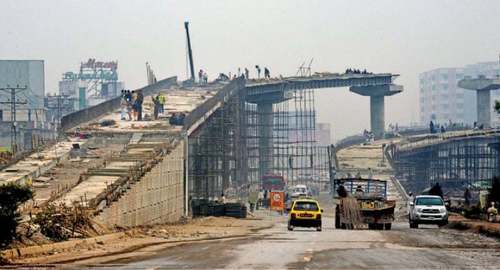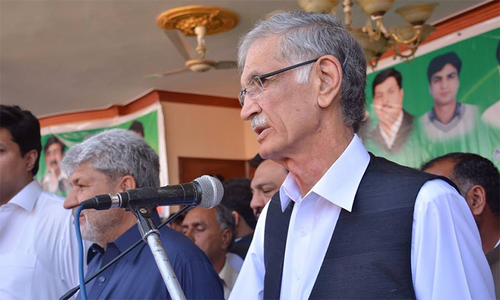The Pakistan Tehreek-i-Insaaf (PTI)-led coalition has finalised an ambitious agenda for development projects, which are supposed to be implemented in the next 15 months ahead of the General Election in 2018.
The agenda envisages a series of projects that will strengthen revenue collection from Khyber-Pakhtunkhwa and establish efficient institutions that will improve governance in the province.
An understanding on the new target was reached on Tuesday between the provincial government and the donor community in Islamabad.
From the donors’ side, representatives from the Department for International Development, United States' and Australia's agencies for international development, the German and Japanese embassies, Japan International Cooperation Agency, Norway, World Bank, Asian Development Bank, Swiss Development Cooperation, European Union and various United Nations organisations were attended the meeting.
The provincial government assured more than 15 development partners that it would achieve the targets set under the Strategic Development Partnership Framework (SDPF) adopted in 2013 and the Integrated Development Strategy (IDS) introduced in 2014.
However, according to the provincial government, the lag in disbursement from donor commitments was a major challenge in achieving these goals.
The new deadline for achieving these targets was set to June 2018, before the next general election. Following a progress review by sectoral committees in different sectors, new targets were set in the areas of revenue collection, economic growth, job creation, improvement in social sectors indicators, gender equity, peace development, improved citizen participation in governance, transparency and accountability.
The High Level Dialogue, an apex forum of the province headed by Chief Minister Pervez Khattak and attended by representatives of all donor agencies, is expected to give a formal nod to the proposal in February 2017.
Presentations given to participants noted that on the revenue side, some improvement had been witnessed in the provincial tax collection since 2013.
However, revenues collected by three provincial agencies – the KP Revenue Authority, Excise and Taxation Department and the Board of Revenue – did not meet their respective projected targets.
The only reason identified for slow progress on this end was capacity issues in revenue departments relating to the collection of revenue and effective implementation of tax laws.
The establishment of dedicated units on tax policy, debt management, corporate governance of public-sector entities and fund management was proposed to strengthen the fiscal management of the province on a macro level. The first three units will be rolled out by March 2017, while the fourth one will be established by December 2017.
Donors were also assured they would receive a summary about the extension of taxes to provincially administered tribal areas after taking all political parties on board. A plan will be evolved for the integration and simplification of taxes to enhance voluntary compliance and taxpayer facilitation.
Another area where sluggishness was observed was the utilisation of local allocation of Annual Development Programme (ADP) funds. In 2013, ADP utilisation was 80 per cent, while over the next two years — 2014-15 and 2015-16 — it remained at 90pc.
On the other hand, the pace of disbursements from donors remained at half of the amount committed to the province.
In the first year, donors disbursed 40.1pc of their commitment, followed by 56.8pc in 2014-15 and 47.6pc in 2015-16, respectively. The need for the full disbursement of the committed amount to the province was also highlighted at the meeting.
The committee was also briefed on the progress in each sector so far.
As part of its reforms strategy for economic revival over the past three years, the KP government has established six authorities or boards related to investment and trade, economic zones, oil and gas companies, energy development, technical education and tourism development.
In the energy sector, four 105MW projects were completed, while three 56MW projects were nearing completion and two 153MW projects were under construction. The province also projected the establishment of new industrial zones by 2018.
The design and construction of a mass transit system for Peshawar city was underway in collaboration with the Asian Development Bank, while work on rail tracks for Greater Peshawar, linking the provincial capital to Mardan, Charsadda, Nowshera and Swabi, were also progressing.
As part of efforts to improve citizen participation, the KP government also devolved 30pc of the provincial development budget to district or city governments.
For gender equity, the implementation of a Women Empowerment Policy Framework and other measures was highlighted, but challenges such as the finalisation of a domestic violence bill, a child marriage restraint bill, an acid control and acid crime prevention bill, and the establishment of the office of ombudsperson were also discussed.
Ambitious targets were also set in the areas of health and education.
At the plenary session, Additional KP Chief Secretary Azam Khan termed SDPF a success in terms of integrating sectoral strategies and harmonising donor funding to promote greater socio-economic development in the province.
“We are entering the important fourth year of the SDPF process, which is also the last year of the IDS. This session has helped set the scene for the next year development agenda,” said Mr. Khan.
Highlighting the achievements and challenges of the SDPF, Planning and Development Secretary Shahab Ali Shah emphasised that traditional governance practices, poor infrastructure, and inadequate capacity at the beginning of the SDPF process were only some of the problems that had been overcome over the past three years.
KP had successfully introduced a regulatory regime with the introduction of new laws and acts for greater transparency and accountability, including the Whistleblowers Protection Act, Prevention of Conflict of Interest Act, Police Ordinance 2016, Medical Institutions Reforms Act, Right to Information Act, and a three-tiered local governance system in the province.














































